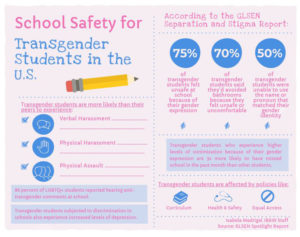 In 2015, Pennsylvania’s Bangor High School suspended 15 students for critiquing discriminatory language during an LGBTQ+ pride event.
In 2015, Pennsylvania’s Bangor High School suspended 15 students for critiquing discriminatory language during an LGBTQ+ pride event.
In 2016, Dominic J., a 13-year-old transgender student from Pennsylvania, told researchers from the Human Rights Watch that he couldn’t enter the men’s or women’s bathroom without being yelled at.
In 2017, students from Boyertown High School in Pennsylvania testified in federal court that allowing transgender students to use bathrooms and locker rooms that align with their gender identity constituted a form of sexual harassment.
Within the state of Pennsylvania, a lack of federal and statewide law diverts the responsibility of enacting comprehensive policies for transgender students, or students whose gender identities differs from that assigned at birth, to each individual school district, leaving some students to suffer discriminatory environments.
Administrators in the Bethlehem Area School District, however, set out to be the first to change the narrative.
“A few years ago, we were one of the first districts in the state to add to our harassment and civil rights policy gender identity as a protected status,” said Joseph Roy, Bethlehem Area School District superintendent. “We wanted to make a statement that we are supportive of our students.”
For transgender students, feeling victimized at school by other students or administrators can lead to academic under-performance, depreciation in physical health and serious emotional and psychiatric consequences.
According to a 2016 study by GLSEN, a group advocating for equitable school environments, “75 percent of transgender students feel unsafe at school because of their gender expression” and are “three times more likely to have missed school in the past month than other students.”
Given the stakes, enacting policies that protect transgender students seemed like an absolute necessity, Roy said.
Although the non-discrimination policy only added four words, Roy said expanding to include “gender expression and identity” served as a first step in aligning the district with values of equity and inclusion.
Introducing protections for gender identity invited some outspoken parents to question the political objectivity of the school board.
Mike Faccinetto, president of the Bethlehem Area School board of directors, said the policy expansion wasn’t a matter of politics but rather of equality for all students in the district.
“Public schools are for everybody, whether you agree or don’t agree with a child’s choice,” Faccinetto said. “It doesn’t mean we don’t want them to feel safe and have a safe environment.”
Most disagreements from community members arise when discussing bathroom and locker room access within Bethlehem Area schools, Roy said.
“We allow students to use the facilities that identify with their gender identity and that has caused some pushback,” Roy said. “But very little.”
Pushback, according to Faccinetto, generally includes district parents’ concerns for the privacy of their cisgender child, or a child whose gender identity matches the sex assigned at birth.
“There was a lot of ‘those people’ comments being made,” Faccinetto said. “They were just completely misguided in their thinking.”
To Faccinetto, this pushback is best answered by simplifying the discussion.
“The question is do you want a kid to be punched in the face for anything?” Faccinetto said. “Or bullied? Or picked on? Either we protect kids, or we don’t.”
While intentional verbiage and policy expansions help increase equity for transgender students on a macro-level, creating a safe environment for LGBTQ+ students looks slightly different within the actual halls of a Bethlehem area school.
At Liberty High School, for example, most efforts toward an equitable community occur not on paper, but within clubs and individual relationships, said Harrison Bailey, principal of Liberty. From an administration standpoint, Bailey said the staff prioritize developing bonds with students over fixating on specific policies.
“General connections with our staff happen on a minute by minute basis,” Bailey said. “Many of our staff connect well with certain kids, and those kids can come knock on the door, sometimes even interrupt their classes because they need to talk.”
But the work toward a completely accepting community within the Bethlehem Area School District is far from over. Adrian Shanker, founder and executive director of the Bradbury-Sullivan LGBT Community Center, said while the Bethlehem Area School District is doing a lot of things right, there are always ways to improve the experience for LGBTQ+ students.
“We should all have an expectation that public schools provide safe and bully free learning environments for all students,” Shanker said. “That’s inherent to our democratic system of education…and yet that’s not the reality for many queer youth and trans youth across the country and here in Pennsylvania.”
Shanker said the Bethlehem Area School District’s structural equity policies, supported LGBTQ+ clubs and effective staff training puts them ahead of the curve, but more can be added from an educational standpoint.
She said it is beneficial for students to relate to the curriculum they are being taught, so if schools provide LGBTQ+ role models in STEM or arts and sciences and teach LGBTQ+ history, this would inevitably make LGBTQ+ more comfortable at school.
Roy agreed that although their efforts thus far have been successful, the pursuit of a completely equitable community constantly evolves with the changing landscape of society.
“We have room to do more,” Roy said. “We could be more proactive in educating teachers. We spend time on a lot of talk about equity and diversity, but that often leads you back to race and poverty and not necessarily other groups that might be experiencing equity issues or discrimination.”
Policy aside, Bailey said that being a support system for transgender students comes down to seeing people as people and meeting them where they are, one person at a time.
“We have to get better,” Bailey said. “We want to make sure that no matter who you are, when you graduate, you feel loved.”





Comment policy
Comments posted to The Brown and White website are reviewed by a moderator before being approved. Incendiary speech or harassing language, including comments targeted at individuals, may be deemed unacceptable and not published. Spam and other soliciting will also be declined.
The Brown and White also reserves the right to not publish entirely anonymous comments.